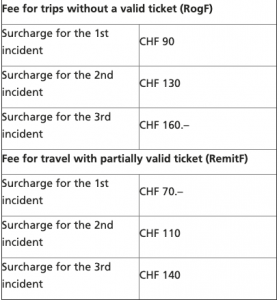Fare evasion remains a major focus for mass transit operators, as it causes losses worth billions of euros each year.
In Switzerland, transit operators have set up a joint national register for fare evaders.
The digital register is active since April 2019 and keeps a record for offences on buses, trams and trains.
Swiss transport operators previously held internal fare evasion databases, independent to each company. Under the current scheme, fare evasion data is shared and fare evaders can be tracked for historical offences nationally.
For example, if a passenger is caught traveling without a valid ticket on a SBB train in Bern in March, and without a ticket on a VBZ tram in Zurich a few months later, this will be considered a repeat offence and a surcharge will apply.
Past statistics indicate that around 3% of the total 2 billion journeys made annually in Switzerland are fare infractions (=60 million illegal trips), bringing losses of €46-92m (CHF 50-100m, $54-108m). However, only 1.4% of offences are actually penalised and recorded.
Privacy considerations
The Swiss Federal Data Protection and Information Commissioner informs that with regards to data protection, personal details will be kept on file for two years from the last offence, after which they will be deleted.
Travellers convicted of offences are entitled to view their files by request. Ticket inspectors or managers cannot access the database directly, but receive feedback in case a person has committed previous offences.
Under the new scheme, ticket fines have the following costs:

In 2018, Swiss Post reported the following fare evasion key figures:
- 75,000 fines
- 30,000 reminders
- 18,000 customer enquiries
- 12,000 complaints for 3rd offences
- 7,000 prosecutions
- 5,000 goodwill claims
There are approximately 250 public transport operators and 17 transport associations in Switzerland, among which SBB, BLS, ZVV, Ostwind.
“We are convinced that the national register acts as a deterrent to regular undocumented drivers.” says Alliance Swiss Pass spokesperson Mr. Thomas Ammann.
Head of Mobility at The Foundation for Consumer Protection SKS Ms. Josianne Walpen supports the database and mentions “We would find it useful to differentiate between wilful and negligent violations.”
Fare evasion – a global issue
In 2019, fare infraction losses amounted to € 500m in France (estimated), $ 250m in New York’s MTA, £100m on London’s TfL, and A$ +80m on Australia’s New South Wales.
Besides the economic impact, fare evasion causes a feeling of insecurity among paying passengers, and leads to acts of incivility in public transport.
Recent breakthrough technologies using AI Video Analytics provide an alternative solution to tackle fare evasion at turnstile gates, by detecting infractions through video streams in real-time. This technology allows ticket inspectors to have faster response rates and run selective controls, with a better chance of catching the offenders compared to traditional mass ticket controls.



